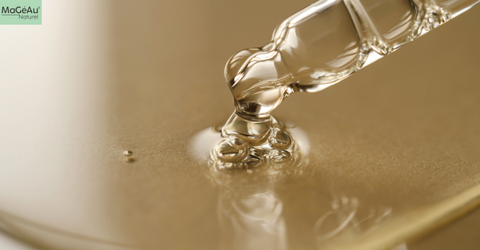Une question nous vient souvent à l’esprit : « Avons-nous vraiment besoin d’utiliser de la crème solaire ? » Oui, nous avons besoin d’une crème solaire pour protéger notre peau des rayons nocifs du soleil. Elle aide à prévenir les coups de soleil, le cancer de la peau et le vieillissement précoce comme les rides. La crème solaire agit comme un bouclier, bloquant les rayons UV dangereux. Sans elle, votre peau peut être endommagée même par temps nuageux. Portez toujours de la crème solaire tous les jours !
En matière de crème solaire, les choix peuvent sembler écrasants. Minérale ou chimique ? FPS 30 ou 50 ? Faut-il choisir une formule mate ou hydratante ? Si toutes les crèmes solaires visent à protéger votre peau des rayons UV nocifs, elles ne sont pas toutes égales. Examinons les différences entre les crèmes solaires minérales et chimiques, leurs avantages et comment faire le meilleur choix pour votre peau.
Quelle est la différence entre les écrans solaires minéraux et chimiques ?
Écrans solaires minéraux
Les écrans solaires minéraux, également appelés écrans solaires physiques, utilisent des minéraux naturels comme l'oxyde de zinc et le dioxyde de titane pour former une couche protectrice sur votre peau. Ces minéraux agissent comme un bouclier, réfléchissant les rayons UV de votre peau.
Avantages :
● Commencez à travailler immédiatement après l’application.
● Plus doux pour les peaux sensibles, ce qui les rend idéaux pour les personnes souffrant de maladies telles que la rosacée , le psoriasis ou l'eczéma.
● Non comédogène, ce qui signifie qu'ils n'obstruent pas vos pores.
Inconvénients :
● Peut laisser une trace blanche, en particulier sur les peaux plus foncées.
● Consistance plus épaisse, qui peut sembler plus lourde sur la peau.
Écrans solaires chimiques
Les écrans solaires chimiques contiennent des ingrédients actifs comme l’avobenzone, l’octinoxate et l’oxybenzone, qui absorbent les rayons UV et les convertissent en chaleur, les libérant de votre peau.
Avantages :
● Léger et plus facile à appliquer.
● Souvent invisibles, ce qui les rend plus adaptés à un usage quotidien sous le maquillage.
Inconvénients :
● Nécessite environ 20 minutes pour devenir efficace après application.
● Peut irriter la peau sensible.
● Certains ingrédients peuvent nuire à l’environnement, notamment aux récifs coralliens.
Problèmes courants rencontrés par les consommateurs
1. Sensibilité et réactions cutanées
Les crèmes solaires chimiques provoquent souvent des picotements ou des irritations, notamment autour des yeux ou sur les peaux sensibles. Les crèmes solaires minérales, bien que plus douces, peuvent parfois paraître trop épaisses ou lourdes.
Solution :
● Si vous avez la peau sensible, optez pour une crème solaire minérale avec des ingrédients hydratants ajoutés pour éviter les irritations.
● Testez un patch du produit sur votre bras avant de l’appliquer sur votre visage.
2. Peau sèche
De nombreux écrans solaires peuvent assécher votre peau, en particulier ceux qui sont chimiques et qui ne contiennent pas d'agents hydratants.
Solution:
● Recherchez des écrans solaires contenant des ingrédients hydratants comme l’acide hyaluronique ou la glycérine.
● Utilisez un nettoyant doux pour le visage avant d’appliquer la crème solaire pour vous assurer que votre peau est propre et préparée à l’hydratation.
● Appliquez ensuite un baume à lèvres hydratant SPF pour protéger vos lèvres, souvent oubliées mais tout aussi vulnérables aux dommages causés par le soleil.
3. Coulée blanche
La teinte blanche laissée par les écrans solaires minéraux est une plainte courante, en particulier chez les personnes ayant un teint moyen à foncé.
Solution:
● Optez pour des crèmes solaires minérales teintées conçues pour mieux se fondre dans votre teint naturel.
● Recherchez des formules étiquetées « oxyde de zinc transparent » ou « transparent ».
4. Problèmes liés à la réapplication
La plupart des gens ont du mal à réappliquer de la crème solaire tout au long de la journée, surtout lorsqu’ils se maquillent.
Solution:
● Utilisez une poudre ou un spray de protection solaire pour une réapplication facile sur le maquillage.
● Définissez des rappels pour renouveler l’application toutes les deux heures, surtout lorsque vous êtes à l’extérieur.
L’importance d’une protection solaire supplémentaire
Même la meilleure crème solaire ne vous protégera pas complètement sans précautions supplémentaires. Voici ce que vous pouvez faire pour maximiser votre protection :
1. Hydratez votre peau
L'exposition au soleil peut déshydrater votre peau, lui donnant une sensation de tiraillement et de desquamation. Une base bien hydratée garantit que votre crème solaire s'applique en douceur et fonctionne efficacement.
● Utilisez une crème hydratante légère avant d’appliquer la crème solaire.
● Buvez beaucoup d’eau pour garder votre peau hydratée de l’intérieur.
2. Utilisez un nettoyant doux pour le visage
En fin de journée, il est essentiel d'éliminer la crème solaire et les autres impuretés sans décaper votre peau. Un nettoyant doux laissera votre peau propre et prête pour l'hydratation nocturne.
3. N'oubliez pas le baume à lèvres SPF
Vos lèvres sont l'une des zones les plus sensibles de votre visage et sont souvent exposées au soleil. Un baume à lèvres SPF les protégera des fissures, du dessèchement et des dommages causés par le soleil.
Quelle crème solaire vous convient le mieux ?
En fin de compte, le choix entre une crème solaire minérale et chimique dépend de votre type de peau, de votre mode de vie et de vos préférences personnelles. Voici quelques conseils rapides pour vous aider à décider :
● Si vous avez la peau sensible : optez pour des écrans solaires minéraux contenant des ingrédients apaisants comme l’aloe vera ou la camomille.
● Si vous êtes actif et transpirez beaucoup : optez pour un écran solaire chimique résistant à l’eau.
● Si vous vous maquillez tous les jours : choisissez une crème solaire chimique légère ou une crème solaire minérale teintée.
● Si vous êtes soucieux de l’environnement : les crèmes solaires minérales sont généralement meilleures pour la planète.
Crème solaire minérale ou chimique, laquelle convient le mieux à votre peau ?
La crème solaire n'est pas seulement un indispensable de l'été ; elle est indispensable toute l'année pour une peau saine et éclatante. Comprendre les différences entre les crèmes solaires minérales et chimiques peut vous aider à faire un choix éclairé qui répond aux besoins de votre peau et à votre style de vie.
Associez votre crème solaire à une routine de soins adaptée : hydratez votre peau, utilisez un nettoyant doux pour le visage et n'oubliez pas un baume à lèvres avec FPS. En prenant ces mesures supplémentaires, vous pouvez profiter du soleil en toute sécurité tout en gardant votre peau protégée et saine.





Commentaires (0)
Il n'y a pas de commentaires pour cet article. Soyez le premier à laisser un message !